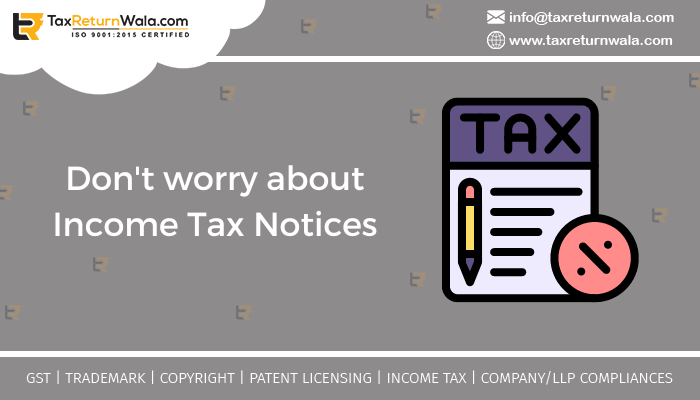You need to be Fine with Income Tax Notices
If you have received an income tax notice, whether automated or with a detailed assessment from the tax officer, it does not mean that you have committed a grave offense. It could be a routine inquiry from the department or a request for clarification on certain transactions.
Knowing how to deal with the income tax notice and filing a reply to it at the earliest should be your priority. This involves a series of actions, such as understanding the issues raised in the notice, seeking advice from a tax professional, and gathering all the relevant documents.
What happens when an income tax notice is received?
It is often observed that taxpayers panic about receiving tax notices from the department, which can lead to hasty or incorrect responses. It is better to stay calm and read the notice carefully, along with taking professional advice. It is essential to know under what section or for what inquiry the notice is issued before filing a reply to it.
When a notice is received, it means that the department has raised some inquiries based on your tax filings, delayed filings, non-filings, some expenses or deductions claimed, some cash transactions done, or if there is a scope of misreporting or under-reporting of income. The department provides a time duration for the taxpayer to file a reply to such notice.
For what reasons are income tax notices generally issued?
There could be one or more reasons why you have received an income tax notice from the department:
- Mismatch of income with expenses and deposits.
- Non-disclosure of income detected by the AIS or under different circumstances.
- Non-filing of ITR in cases of TDS deduction.
- Failure to file a tax return before the deadline or filing a belated return.
- Mismatch of incomes with Form 26AS.
- Suspected income under different sections or cases of underreporting.
- High-value transactions or cash deposits are made with no proper clarifications in the tax return.
- Non-disclosure of various incomes like dividends, interest income, etc.
- Wrong deductions or exemptions claimed under wrong sections.
Can you deal with an income tax notice by yourself?
An income tax notice can be complex to understand and respond to if you do not have a good understanding of the tax laws. It is advisable to seek the assistance of a qualified tax professional or an agency experienced in handling tax compliance matters and legal issues.
An ideal approach to replying to an income tax notice should be:
Read the notice carefully to understand the issue raised by the tax department and the documents/information asked for.
- Seek guidance from a tax expert to know how to resolve the matter and the documents needed.
- Gather all the relevant documents supporting your claims and filings.
- File the reply to the income tax notice with the help of the tax expert within the stipulated time.
Types and Nature of income tax notices under the Income Tax Act, 1961
Some of the most common tax notices issued to taxpayers include:
- Notice/intimation under Section 143(1): This notice/intimation is sent to the taxpayer providing a comparative computation of the department’s assessment with that of the filed income tax return by the taxpayer for any further tax demand or the refund required/permitted by the department.
- Notice/intimation under Section 142(1): Sent as a notice to the taxpayer to furnish his ITR if not done earlier or to provide documents or information in support of particulars filed in the ITR.
- Notice/intimation under Section 139(1): A notice sent by the department for admitted mistakes in the information filed in the return or rectification of the ITR filed. Such notices generally come with a deadline of 15 days.
- Notice/intimation under Section 139(9): Tax notice for intimation of a defective return filed by the taxpayer with no proper statements or documents attached.
- Notice/intimation under Section 148:Tax notice issued to the taxpayer to explain certain incomes reported or to reassess the income if there is a disagreement between the officer and the taxpayer in assessing such income.
- Notice/intimation under Section 143(2)u/156:Notice from the assessing officer for additional tax demand computed, which can be due to undisclosed income or less reporting of income. Such notices are issued with a response submission period of a minimum of 30 days.
- Notice/intimation under Section 245:Demand notice issued by the tax assessing officer for any additional tax payable after adjustment to refunds of the taxpayer.
What if you do not respond to an income tax notice?
Not responding to an income tax notice can have serious consequences for the taxpayer. Under different sections, penalties for common misreporting or underreporting issues can range from interest charges, fines, or even a penalty of 200% of the tax payable.
In cases of assessed disagreements or complications with the return filed and those with the transactions made during the year, the penalty can be more severe or even lead to imprisonment of the taxpayer.
Therefore, it is advisable to deal with a tax notice as soon as possible by approaching a tax filing professional to understand your case. A tax professional is qualified to file your reply to the tax notice and can save you from the hefty penalties of the department.
Income tax notices can be daunting, but they do not have to be. By understanding the nature of the notice, seeking professional advice, and gathering all the relevant documents, you can effectively deal with an income tax notice and avoid any negative consequences.
Received an income tax notice?
Drop us a line at info@taxreturnwala.com


